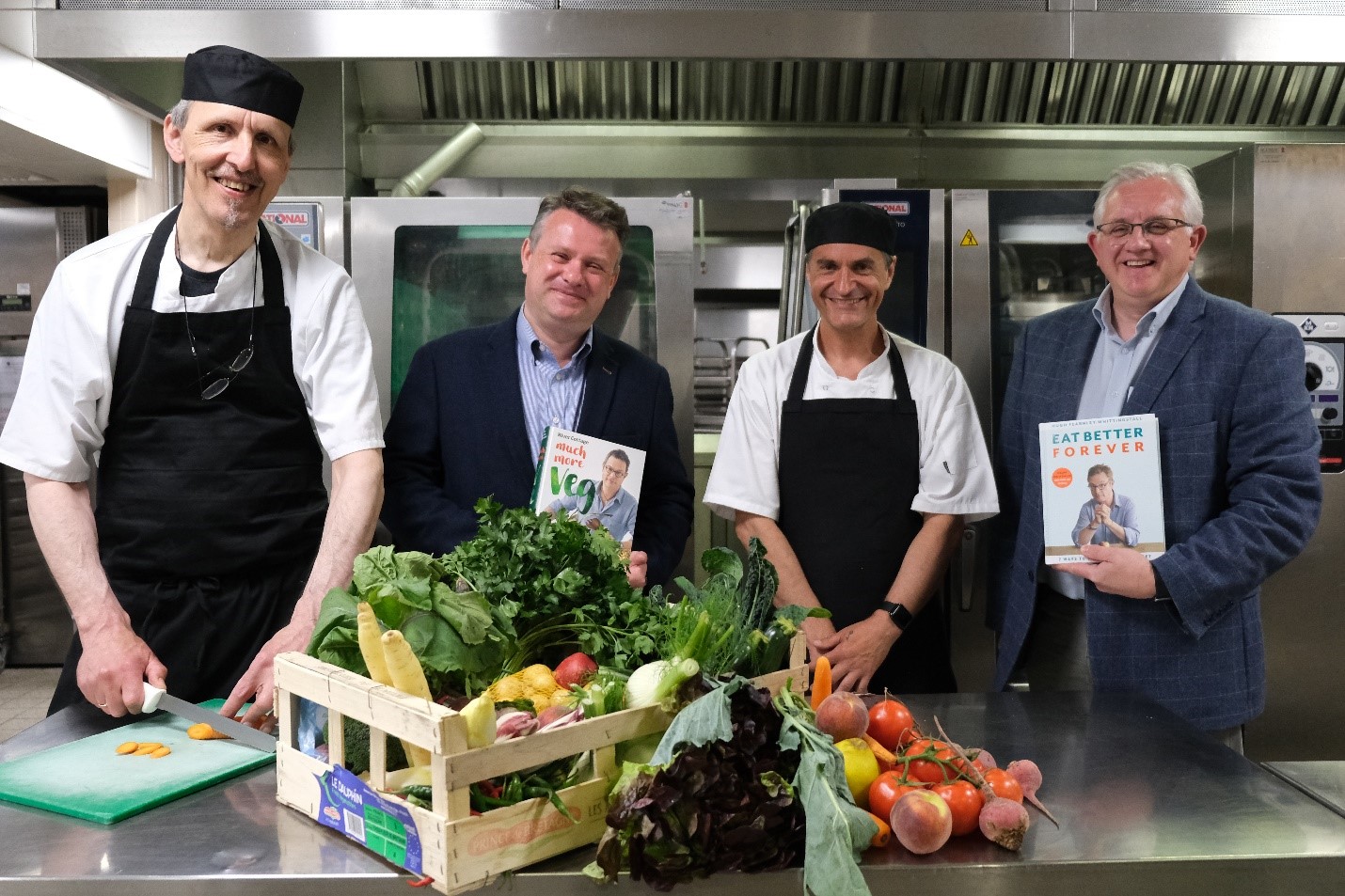 The catering team receiving the Peas Please Rising Star award. Credit: Ian Macaulay
The catering team receiving the Peas Please Rising Star award. Credit: Ian Macaulay
The University of Edinburgh are an active member of the food partnership, Edible Edinburgh. In recent years, the catering team on campus have been making changes to their food offer to reduce their impact on the climate.
Creating the right policies
In 2016, the university developed a Good Food Policy, setting up a holistical approach to food and its connection to health and sustainability. Built on ambitions in five key areas: sourcing, provision, practice, research, learning and teaching and leadership and culture, it sets out ambitions commitments to keep food systems within environmental limits whilst supporting sustainable livelihoods.
Across campus, there is action happening to ensure sustainable food practices are implemented throughout the university. Most recently, the catering team has been awarded a Peas Please Rising Star award for serving more veg, as part of their commitment to provide climate friendly dishes to promote health, support the planet and invest in local producers and suppliers.
Ian Macaulay, Catering Director, The University of Edinburgh
“From the creation of our Good Food Policy in 2016 it has always been our commitment to have stretched targets with a key one being our commitment to increase the availability of plant based/vegetarian options throughout all our catering operations. Success has been achieved though developing our food offers in line with changing student demands as well as nudging behaviours. We fully expect in future years to see this percentage grow even further driven by student demand and it is important for any University catering operation to be at the front ready to adapt and embed this change within their food development”
Below are a few areas of action at the university which are helping to address the impact of food on our climate:
More veg and pulses, less and better meat
The catering team are on a mission to increase vegetable consumption and have reached their target to ensure 50% of meals served on campus outlets to be plant-based, with a strategy to gradually nudge behavior and increase this in response to demand from staff and students. To increase the amount and diversity of veg on offer, they have also upped the serving to two options and increased the weight of veg per hot meal from 90 to 150grams.
The caterers, who hold a Food for Life Bronze award, source a wide range of organic products including seeds, grains and pulses and rotate their menus regularly to cater for the change in seasonal veg on offer. For meat and dairy, the team only provide free-range eggs from the UK, milk from Scotland, all seafood is ranked between 1 and 3 by the Marine Conservation Society and 70% of all meat is British. Tea, coffee and chocolate are Fairtrade and the coffee supplier has planted over 1,200 trees as a result of sales on campus, including an apple and plum orchard.
Simon Kenton-Lake, Policy and Project Officer,
“By serving a minimum of 50% vegetarian or meals and upping veg servings per meal, the catering team have made a great commitment to support both the health of the students and the health of the planet. Increasing consumption of veg and pulses and serving less and better meat are some of the most powerful ways to reduce impact on climate and nature and the university have created an enabling environment for the students to make more sustainable decisions through diet choices.”
Less waste
A key way to reduce the climate impact of inedible food waste is through composting and the university has started to recycle all of their coffee grounds into nutritious compost for the landscaping team to use on campus. The catering team has also signed up to the Too Good to Go waste prevention app, to redirect surplus that would otherwise go to waste to the local community at a reduced price.
Food Growing
Whilst not (yet) supplying food into the university, the newly formed Food Security and Sustainability Society run an agricultural plot on campus and have begun to grow organic vegetables using regenerative practices and the society have been campaigning to encourage more sustainable food choices.
The society is also working with the catering team to develop ‘planetary dish’ options on the menu, so students can make informed choices about what they choose to eat.
Catering teams can have great influence
University caterers, in particular, have leverage to source food and drink that is produced to environmentally, socially and economically sustainable standards and good food policies across university departments can have a cascading affect across the supply chain. As a result, this encourages producers and suppliers to improve their practices, and nudges the consumer, in this case the students, to make better, well-informed, choices that are better for the planet and people. The caterers at University of Edinburgh have made great strides to reduce their environmental impact and it's great to see there is appetite from both staff and students to take this further.
Sustainable food procurement is a powerful way to reduce the climate footprint of food in your area. Why not sign up to the Food for the Planet campaign to make it happen?
Food for the Planet: Food for the Planet is helping local authorities, businesses and organisations take simple actions to tackle the climate and nature emergency through food.
Sustain
The Green House
244-254 Cambridge Heath Road
London E2 9DA
020 3559 6777
sustain@sustainweb.org
Sustain advocates food and agriculture policies and practices that enhance the health and welfare of people and animals, improve the working and living environment, promote equity and enrich society and culture.
© Sustain 2024
Registered charity (no. 1018643)
Data privacy & cookies







